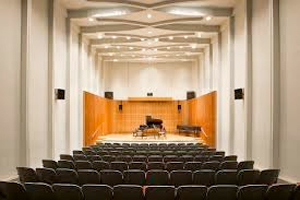by Daniel Hautzinger

Cleveland Orchestra principal oboist Frank Rosenwein is a paragon of lyricism. To listen to him effortlessly shape phrases in Henk Badings’ 1946 Trio IVa for two oboes and English horn is a supreme pleasure; to hear him in intimate exchanges with Tim Daniels, oboe, and Robert Walters, English horn, was miraculous.
Walters, who is principal English horn in TCO and teaches oboe and English horn at Oberlin, sustained impossibly long lines with nuanced vibrato in “Canto amoroso,” the second movement of Badings’ three-movement work. Rosenwein’s plaints flared over the richly complex tone of Daniels, who is a student of Walters. That charged the movement’s erotic melancholy with enough ardency to induce a sighed “oh, man” from an audience member at its conclusion.
The Quartet for English horn, violin, viola and cello by Philip Maneval from 1987 was equally impactful. TCO musicians Stephen Rose and Charles Bernard joined Walters and his Oberlin faculty colleague Michael Strauss for this fervidly expressive quartet in three movements. Rose, Bernard and Strauss immersed themselves in Maneval’s tense harmonies and twilit textures. Such dedication to their parts, combined with Walters’ plangent playing, served as an overwhelming experience, especially in the “Adagio cantabile.”
The movement begins with the viola and violin grating against each other in unpredictable patterns. The cello intones a somber melody over the oscillations, and the entrance of the English horn fans the music to searing intensity. Finally, the original cello melody comes back, profoundly altered by the drama it has just witnessed. Bernard’s subtle, understated phrasing beautifully illuminated the deep sadness in the return.
More of such darkness would be draining, but the rest of the concert was, wisely, lighthearted and jaunty. Strauss, Rose, and Bernard essentially became accompanists to Oberlin flute professor Alexa Still in Mozart’s Flute Quartet in D, K. 285. The genteel “Allegro” was overshadowed by the songful “Adagio,” in which the strings imbued their simple pizzicato background with enough direction to make it as important as Still’s relaxed playing of the tune. Joie de vivre radiated from the musicians in the final “Rondeau,” so that it was impossible not to beam along with them.
That French love of life, along with esprit and élan, also saturates Jean Françaix’s 1994 Trio for oboe, bassoon, and piano, the last piece on the program. Françaix’s music is like an over-excited kid in a toy store, running between colorful baubles with no reason determining the path, discarding each as soon as something brighter catches the eye. But Rosenwein and Oberlin professors George Sakakeeny, bassoon, and Haewon Song, piano, managed to romp through Françaix’s frolics convincingly and enjoyably. The dialogue between Sakakeeny and Rosenwein in the “Andante” was lovely, and Song’s jocular playing in the “Scherzo” and “Finale” contributed cartoonish fun.
Published on ClevelandClassical.com January 20, 2015.
Click here for a printable copy of this article


